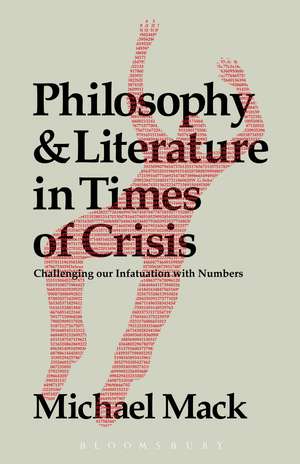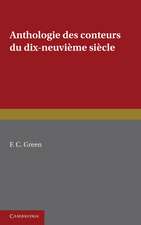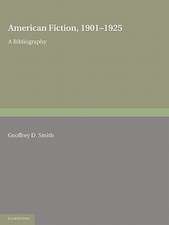Philosophy and Literature in Times of Crisis: Challenging our Infatuation with Numbers
Autor Dr Michael Macken Limba Engleză Paperback – 9 apr 2014
| Toate formatele și edițiile | Preț | Express |
|---|---|---|
| Paperback (1) | 191.38 lei 43-57 zile | |
| Bloomsbury Publishing – 9 apr 2014 | 191.38 lei 43-57 zile | |
| Hardback (1) | 829.82 lei 43-57 zile | |
| Bloomsbury Publishing – 9 apr 2014 | 829.82 lei 43-57 zile |
Preț: 191.38 lei
Preț vechi: 222.08 lei
-14% Nou
Puncte Express: 287
Preț estimativ în valută:
36.62€ • 38.33$ • 30.48£
36.62€ • 38.33$ • 30.48£
Carte tipărită la comandă
Livrare economică 31 martie-14 aprilie
Preluare comenzi: 021 569.72.76
Specificații
ISBN-13: 9781623566494
ISBN-10: 1623566495
Pagini: 248
Dimensiuni: 140 x 216 x 20 mm
Greutate: 0.34 kg
Editura: Bloomsbury Publishing
Colecția Bloomsbury Academic
Locul publicării:New York, United States
ISBN-10: 1623566495
Pagini: 248
Dimensiuni: 140 x 216 x 20 mm
Greutate: 0.34 kg
Editura: Bloomsbury Publishing
Colecția Bloomsbury Academic
Locul publicării:New York, United States
Caracteristici
Draws on a wide array of diverse writers and thinkers, from Shakespeare to Philip Roth
Notă biografică
Michael Mack (PhD. Cambridge) is Reader in English Literature and Medical Humanities at Durham University, UK. Formerly he has been a Visiting Professor at Syracuse University, a Fellow at the University of Sydney, and lecturer and research fellow at the University of Chicago. He is the author of Spinoza and the Specters of Modernity (2010), German Idealism and the Jew (2003), which was shortlisted for The Koret Jewish Book Award 2004, and Anthropology as Memory (Niemeyer, 2001, Conditio Judaica Series).
Cuprins
ContentsAcknowledgmentsIntroduction: Objects and number: Our Current Infatuation Chapter 1. What is it about Numbers? Chapter 2. Playing the Numbers: Ethics and Economics.Chapter 3. Certainty and the Predictability of Numbers: the question of Literary Ethics.Chapter 4. A Disenchantment with Numbers: Philosophy and Literature.Chapter 5. Medicine and the Limits of Numbers. Chapter 6. Towards a Numerical Ambiguity.Conclusion: From Numbers to the Individual: A New Ethics of Subjectivity. BibliographyIndex
Recenzii
Philosophy and Literature in Times of Crisis is an invaluable achievement; it constitutes essential reading for anyone interested in the medical humanities.
The book ranges widely over literature and philosophy from Shakespeare and Deleuze to Sylvia Plath, Saint Augustine, Bernard Malamud, and Bernard Williams, among many others. It deals with an important topic: the reductionist nature of contemporary thought, which requires assessment and quantification of everything, including the meaning of life. We have become impoverished, and we have been distracted by that which is "merely objective." But can literature save us? At the very least, it can help us break free from the dominant paradigm and "our infatuation with numbers." Summing Up: Recommended. Graduate students and researchers/faculty.
Mack's project in this important book builds upon his previous work, especially that in How Literature Changes the Way We Think (Continuum, 2011). Here he reveals the pseudo-theological foundations of the belief in numbers that ground the current cultural value of the social sciences and in particular economics and medicine as purely rational and objective. . Throughout his persuasive deconstruction of the West's belief in economics, science, and medicine as value-neutral, Mack further shows how these have appropriated Christian theology's emphasis on eternal life, sin, and redemption as structuring concepts, bearing 'witness to theology's persistence in a non-theological age.' . Mack effects a change of perspective on not only economics and medicine but also on literature and, by the way, on theology. This book is worth reading with care, pencil in hand, and time.
Philosophy and Literature in Times of Crisis is, very consciously, a timely book. The crisis of the title is the political climate in which higher education in the arts and humanities currently finds itself. . In addressing its subject at a fundamental and foundational level, it interrogates the basic conditions which underlie contemporary attitudes to the arts and their uses, illuminating the genealogy of modern ideology in our theological inheritance and the anxieties attending the creep of secularisation over the last two hundred years. . Its rich and often philosophically-complex synthetic sections should appeal to specialists throughout the arts and humanities who desire a greater insight into the processes by which their field has been rendered marginal.
Erudite and incisive, Michael Mack crucially poises literary and philosophical events and contestations. The book explores rhetorical as well as conceptual operations capable of taking out some of our abiding--and culturally pernicious--attachment disorders.
Philosophy and Literature in Times of Crisis is a stunningly brilliant analysis of our increasingly digitalized culture that celebrates the quantifiable conceptions of the good life. Drawing upon a polymathic erudition, Mack challenges the regnant epistemological and disciplinary dichotomies that sustain an opposition between subjectivity and objectivity, which, in turn, sponsor fetishistic adoration of the scientific and economic paradigms that has led to the eclipse of the ethical as the ultimate arbiter of a life worth living.
The book ranges widely over literature and philosophy from Shakespeare and Deleuze to Sylvia Plath, Saint Augustine, Bernard Malamud, and Bernard Williams, among many others. It deals with an important topic: the reductionist nature of contemporary thought, which requires assessment and quantification of everything, including the meaning of life. We have become impoverished, and we have been distracted by that which is "merely objective." But can literature save us? At the very least, it can help us break free from the dominant paradigm and "our infatuation with numbers." Summing Up: Recommended. Graduate students and researchers/faculty.
Mack's project in this important book builds upon his previous work, especially that in How Literature Changes the Way We Think (Continuum, 2011). Here he reveals the pseudo-theological foundations of the belief in numbers that ground the current cultural value of the social sciences and in particular economics and medicine as purely rational and objective. . Throughout his persuasive deconstruction of the West's belief in economics, science, and medicine as value-neutral, Mack further shows how these have appropriated Christian theology's emphasis on eternal life, sin, and redemption as structuring concepts, bearing 'witness to theology's persistence in a non-theological age.' . Mack effects a change of perspective on not only economics and medicine but also on literature and, by the way, on theology. This book is worth reading with care, pencil in hand, and time.
Philosophy and Literature in Times of Crisis is, very consciously, a timely book. The crisis of the title is the political climate in which higher education in the arts and humanities currently finds itself. . In addressing its subject at a fundamental and foundational level, it interrogates the basic conditions which underlie contemporary attitudes to the arts and their uses, illuminating the genealogy of modern ideology in our theological inheritance and the anxieties attending the creep of secularisation over the last two hundred years. . Its rich and often philosophically-complex synthetic sections should appeal to specialists throughout the arts and humanities who desire a greater insight into the processes by which their field has been rendered marginal.
Erudite and incisive, Michael Mack crucially poises literary and philosophical events and contestations. The book explores rhetorical as well as conceptual operations capable of taking out some of our abiding--and culturally pernicious--attachment disorders.
Philosophy and Literature in Times of Crisis is a stunningly brilliant analysis of our increasingly digitalized culture that celebrates the quantifiable conceptions of the good life. Drawing upon a polymathic erudition, Mack challenges the regnant epistemological and disciplinary dichotomies that sustain an opposition between subjectivity and objectivity, which, in turn, sponsor fetishistic adoration of the scientific and economic paradigms that has led to the eclipse of the ethical as the ultimate arbiter of a life worth living.



















